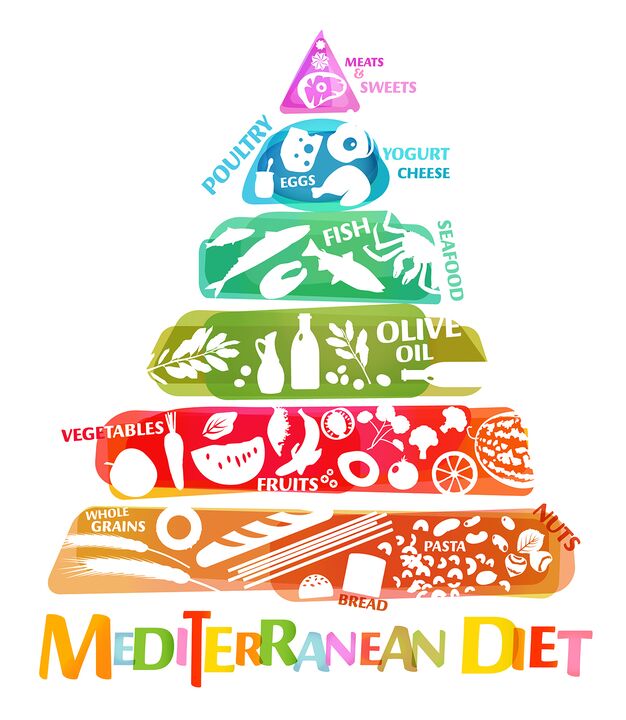
The Mediterranean diet has no contraindications or strict restrictions. And most importantly, the kilograms lost will not return. With the doctor, we found out the secret.
How the Mediterranean diet works
The popularity of the Mediterranean diet is easily explained. Scientists have found that due to the peculiarities of the diet, the population of Mediterranean countries rarely suffer from heart disease and obesity. Although in the ordinary sense, this is actually not a diet, but rather a group of healthy eating habits that are typical of Greeks, Italians, Spaniards, Moroccans. There are no strict restrictions, rules and numbers here. This is primarily intended to teach the body to a balanced diet and improve health.
At the same time, the kilograms run very slowly and smoothly: it may take around six months to see the first results. But there is an advantage here. You do not have to starve, which means that the body will not experience stress. This approach allows you to maintain good shape for a long time and prevent weight gain in the future. Another advantage of this diet is that it can be followed at all times, as it allows you to eat delicious, healthy and varied.

Foods to include in the diet
The Mediterranean diet menu is rich in plant foods, lean fish and seafood. It is balanced and contains all the essential nutrients for the body, therefore it is suitable for almost everyone. You should not try such a diet only if there is an individual allergy or intolerance to a particular food. Nice bonus: allowed to change the menu depending on your choice.
- Focus on fresh fruits, vegetables, nuts, legumes, and whole grains. They should be the basis of the diet. So try to prioritize the least processed foods, ideally organic.
- Save red meats and sausages for special occasions. They can be included in the menu no more than twice a month. You also can't get carried away with chicken and eggs. But in fish and seafood, you can’t limit yourself. With such a diet, it is recommended to eat it daily or at least twice a week.
- Eat more low -fat dairy and fermented products. The main thing is that they have no sugar, flavors and fillers.
- Drink plenty of clean water. Tea and coffee lovers can enjoy the usual pleasures, but don’t add sugar to drinks. In addition, if you want, you can drink one glass of dry red wine a day.
- The Mediterranean diet has three main meals - breakfast, lunch and dinner. If you feel hungry, you can consume a large number of nuts, berries, Greek yogurt, or fruit.
- With such a diet, you do not have to count calories and monitor the ratio of macronutrients that enter the body - protein, fat, carbohydrates. If you decide to eat at a restaurant, choose seafood or fish. In this case, it is recommended to ask them to fry it with olive oil.
- Don’t forget about sleep and healthy physical activity - move at least 30 minutes a day. Moderate exercise will speed up the weight loss process. In addition, adherents of the Mediterranean diet pay special attention to communication with loved ones. If possible, cook and sit down with the family to uplift and relieve stress that often leads to overeating.
Main product list:
- Vegetables: tomatoes, cucumbers, broccoli, cauliflower, zucchini, spinach, onions, potatoes, Jerusalem artichokes, carrots, radishes.
- Fruits and berries: apples, pears, bananas, oranges, tangerines, strawberries, grapes, dates, figs, melons, peaches.
- Nuts and Seeds: Almonds, Walnuts, Macadamia, Hazelnuts, Mete, Sunflower Seeds, Pumpkin Seeds.
- Beans: beans, peas, lentils, peanuts, beans.
- Cereals: Whole oats, brown rice, rye, barley, corn, buckwheat, whole wheat bread, durum wheat pasta.
- Fish and seafood: salmon, sardines, trout, tuna, mackerel, shrimp, oysters, clams, crabs, clams.
- Beans: chicken, duck, turkey.
- Eggs: chicken, quail, duck.
- Dairy products: cheese, low -fat cottage cheese, Greek yogurt.
- Herbs and spices: garlic, basil, mint, rosemary, sage, nutmeg, cinnamon, turmeric, pepper.
- Healthy fats: Extra virgin olive oil, olive, avocado and avocado oil.
A number of expensive products, if necessary, can be replaced with more affordable and common products. So, instead of Greek yogurt, you can take regular kefir or homemade yogurt. Whole grains are replaced with buckwheat, barley and oatmeal, and trout or tuna are replaced with herring, which contain equally important omega-3 fatty acids. White cabbage is a good alternative to broccoli, and seasonal fruits are excellent for figs and peaches. You can also save on olive oil. For example, unrefined sunflower oil contains more omega-6s, phytosterols, and vitamin E.

Foods to avoid
The Mediterranean diet has no taboos. Even so, the intake of some foods should be reduced, or better yet, completely eliminated. These include white sugar, wheat flour, snacks, refined butter, liquor, sodas, fast foods, and highly processed foods (chocolate bars, snacks, sausages, sausages). Use dried herbs and spices instead of salt. It is better to give up regular foods gradually - this will help reduce stress for the body.
Weekly menu options
Monday
- Breakfast: Greek yogurt with fresh berries and granola.
- Lunch: Lentil soup and whole wheat avocado sandwich.
- Dinner: tuna salad with beans, apples and olive oil.
Tuesday
- Breakfast: oatmeal with raisins and honey.
- Lunch: minestrone soup and seafood salad.
- Dinner: broccoli casserole and natural yogurt.
Wednesday
- Breakfast: omelet with vegetables, tomatoes and olives.
- Lunch: grilled fish and bulgur with green beans.
- Dinner: a glass of kefir and a casserole of low -fat cottage cheese.
Thursday
- Breakfast: natural yogurt with fruits and nuts.
- Lunch: whole wheat salmon and avocado sandwich.
- Dinner: boiled white cabbage with chicken breast.
Friday
- Breakfast: oatmeal with nuts and honey.
- Lunch: brown rice with eggs, onions and avocado.
- Dinner: pasta with seafood and a glass of red wine.
Saturday
- Breakfast: two boiled eggs and fried vegetables.
- Lunch: durum wheat spaghetti and roast beef.
- Dinner: full-grain pizza with cheese and vegetables.
Sunday
- Breakfast: steamed cheesecake, fruit and honey.
- Lunch: fish and cucumber soup and tomato salad.
- Dinner: Vegetable lasagna and a glass of red wine.
The effectiveness and benefits of the Mediterranean diet
The main advantage of the diet is the benefits for the body. It is no coincidence that nutritionists have designated it as one of the safest food systems. This is evidenced by the results of many years of research. Here are some scientifically proven facts about how the Mediterranean diet affects the body.

1. Strengthens the heart
For their study, Spanish scientists invited 7447 volunteers aged 55-80 years who had an increased risk of cardiovascular disease. Participants were offered three diets - a Mediterranean diet with extra virgin olive oil, a Mediterranean diet with an emphasis on nuts, and a low -fat diet. For the next five years, specialists monitor the health of participants.
The results of the study showed that people who followed the Mediterranean diet experienced a reduction of almost a third of the risk of stroke and heart attack. According to scientists, diet helps eliminate "bad" cholesterol from the body, and also normalizes blood pressure and sugar levels.
2. Helps prevent diabetes
The same scientists sought to find out how the Mediterranean diet influenced the occurrence of type 2 diabetes. To do this, they assessed the condition of 418 people who did not have the disease at the beginning of the study. Among those who chose the Mediterranean diet, the chances of developing diabetes were 52% lower than those who followed a low -fat diet.
3. Improve intestinal function
According to a study of an international group of scientists, the Mediterranean diet has a beneficial effect on the intestinal microflora. Specialists monitor the health of 612 people aged 65–79 from Poland, Britain, the Netherlands, France and Italy. Subjects followed the Mediterranean diet for one year. As a result, they experience a slower loss of bacterial diversity and an increase in the number of "good" bacteria and beneficial fatty acids. At the same time, the amount of chemicals that cause inflammation and bacteria involved in the formation of bile acids decreases.
4. Prolong life
Cardiologists at the University Hospital in Saint-Etienne (France) found that the Mediterranean diet can reduce the risk of premature death. The study involved 605 people who had had a heart attack six months earlier. They are also offered two food options - a low -fat diet and a Mediterranean diet. The researchers monitored the patient’s health for four years. In the Mediterranean diet group, the risk of death from all causes was 45% lower, and from heart disease by 70%.
5. Helps lose weight
With the Mediterranean diet, you can normalize weight without counting calories. This is the conclusion reached by scientists from the Second University of Naples. The study involved 99 men and 81 women. They are divided into two groups. One should adhere to the recommended levels of protein, carbohydrates and fats, the other-to increase consumption of grains, nuts, fruits, vegetables, olive oil. Two years later, scientists evaluated the results: in the Mediterranean diet group, weight loss was three times greater.
This is confirmed by a study of Canadian experts. According to him, the Mediterranean diet is no less effective than the low -carbohydrate diet. With its help, you can lose weight up to 10 kg per year. If you want to speed up your weight loss, calculate your calorie intake and stick to it while compiling the menu.
Italian doctors conducted another large study involving 32, 119 volunteers. For almost 12 years, all participants adhered to the principles of the Mediterranean diet. It turns out that long -term adherence to this diet reduces the risk of weight gain and accumulation of fat in the abdomen for the next five years after stopping the diet.

Doctor's comment
Does the Mediterranean diet have any shortcomings?
The principles of the Mediterranean diet are in line with WHO recommendations. It is rich in vegetables and fruits, the right complex carbohydrates, healthy monounsaturated fatty acids, complete protein. Restrictions only apply to fast carbohydrates, fast foods, comfort foods, and foods rich in trans fats. Staying away from such a diet of food, a person who follows the principles of the Mediterranean diet, for the most part, begins to lose weight. The process is not fast, but it is the best. Rapid weight loss is detrimental to health.
Since the Mediterranean diet involves the intake of large amounts of vegetables, fish, seafood, high-quality vegetable oils, food baskets will be more expensive. But health should not be spared. Because a balanced nutritious diet is the key to harmonious development.
Dried red wine is considered one of the most important components of the Mediterranean diet, which explains its benefits. Really? And how much wine is safe?
As a rule, no more than 150 ml of wine a day is safe for women, and no more than 200 ml for men. It is best not to drink this amount all at once, but to distribute it throughout the day. Drinking wine is not an important part of the Mediterranean diet. It can and should be ignored if you have liver or heart problems, or if you are unable to control your alcohol intake. Instead, wine is part of a geographical tradition.
Who shouldn’t try this diet?
The Mediterranean diet is versatile and has no strict contraindications due to a balanced and varied diet. However, due to its high fat content, this type of diet should be handled with caution in those with liver or gastrointestinal tract disease. You should see a doctor first. Naturally, it should be limited to people who have allergic reactions and intolerance to foods used in the diet.
Some doctors recommend the Mediterranean diet for coronavirus prevention. Is this allowed?
To fight a viral infection, it is important to maintain the immune system. And the activity of the immune system directly depends on what we eat. If your diet is balanced, rich in vegetables and fruits, you consume enough fiber, do not neglect grains and legumes, get complete protein and all the essential fatty acids-it will be easier for the body to fight infections. The Mediterranean diet meets all these conditions. Therefore, it can be used to prevent not only coronaviruses, but also other viral diseases.




























